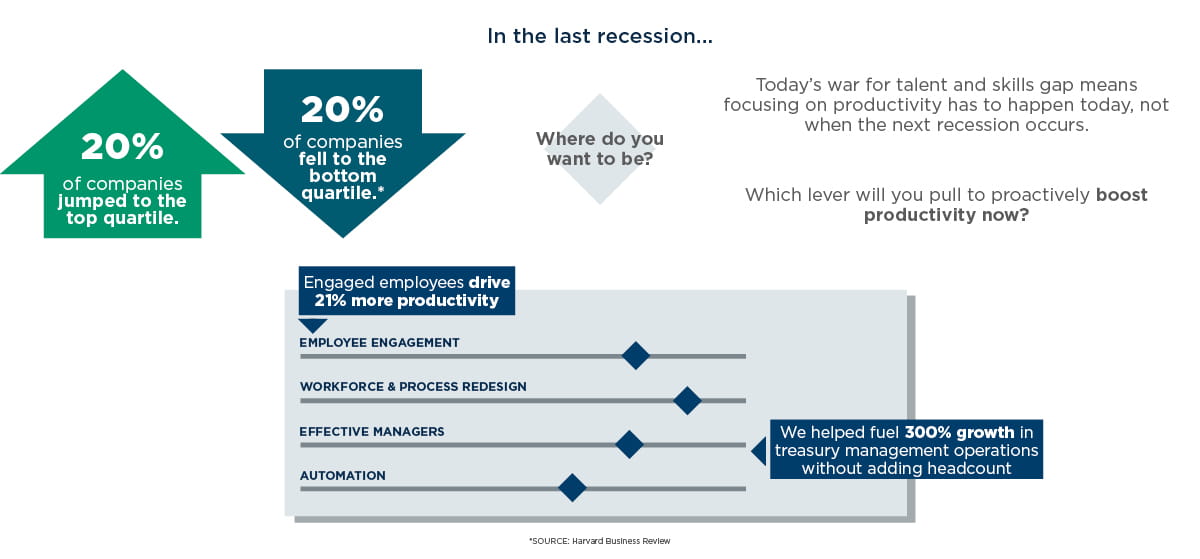
June 2019 | Point of View
A recession is coming: Maximize productivity and you can weather it
75% of CFOs expect another recession by the end of 2020. In the last recession, 20% of companies in the bottom quartile leapfrogged to the top by recession's end—by focusing on productivity gains before the downturn hit.
A recession is coming: Maximize productivity and you can weather it
But knowing you need to prepare and knowing how to prepare are two very different things. Most businesses are unsure where to look for productivity boosting opportunities. They attempt to take on too much too quickly, addressing a range of symptoms rather than the root cause. Managers, lost in the fray, quickly become ineffective.
The good news is that with decades of consulting experience under our belts, we’re confident the biggest productivity gains will come from the following three categories. Focus on these, and you’ll put yourself in a position of strength—whether and whenever a recession hits.
-
Process optimization and automation. A West Monroe poll found that 60% of managers are spending more than three hours a day on administrative work. Optimizing and potentially automating these manual tasks can reduce errors, improve process times, and increase employee satisfaction. In addition, organizations should review other areas of operations to mitigate complexity, identify value-add activities, and decrease cycle times across the organization. It’s also crucial to understand and deploy the right KPIs to measure and govern these improvements to ensure overall value realization.
-
Work redesign. Companies today can improve productivity by modernizing organizational design and reporting structures, reducing rework through system consolidation or shifts to self-service models, and outsourcing non-core capabilities to lower-cost providers.
-
Employee engagement and capability development. Disengaged employees account for $600 billion in productivity losses across the economy, according to Gartner. And with the war for talent raging—for the first time, the number of job openings exceeds the number of available workers—empowering your existing talent is the shortest path to peak productivity. Start by identifying gaps in skill sets and creating a training plan to improve or create new capabilities. Also, make sure leadership is doing its part to provide managers with the time, know-how, and strategic vision they need to be engaged and drive engagement among their employees.
Any one of these categories might require long term strategies, though quick wins can certainly be realized. Set goals carefully. Plan precisely how to get there. And measure what matters. Data is key in this respect: It can help identify the right and most viable areas to concentrate your efforts.
It’s important to take action now if you want to capitalize on a recession. For the first time in years, challengers will have the opportunity to overtake their industries’ reigning market leaders—many of whom will have to prioritize cost-cutting over customer experience and retention, if they didn’t plan accordingly.
During the economic downturn of 2001, Dell’s executives favored cost reductions over improving experiences with phone agents. Five years later, the company still hadn’t made up its lost market share.
Dell’s story is just one reminder that cost-cutting alone isn’t enough. Rather, businesses that will win in the next recession will have leaders willing to take action and make realistic productivity gains before the storm comes.
And that’s a fact.
Is your colony high-performing? See what's possible when you prepare.

